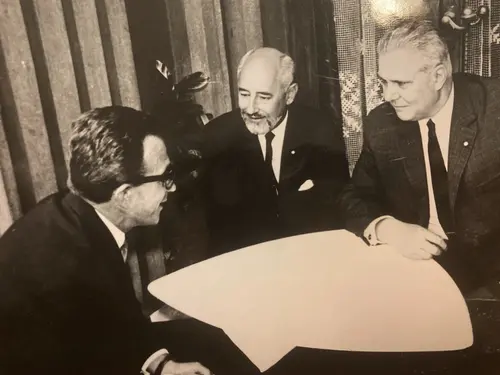
All Stories
Stories of daring, stories of technological feats, stories of prevailing against the odds ... these are the stories we tell at the National Air and Space Museum. Dive in to the stories below to discover, learn, and be inspired.
Showing 61 - 70 of 1839

June 24, 2025
In World War II, This Unusual Airplane Could Launch from a Submarine
The National Air and Space Museum's in-depth look at the world’s only surviving example of the Japanese Aichi M6A1 Seiran.

June 24, 2025
The National Air and Space Museum’s Impressive Makeover
Message from the director. The National Mall Museum will open the Lockheed Martin IMAX Theater, and five more galleries July 28, 2025.

June 18, 2025
The Last Artifact from the Society for Space Travel
On display at the Steven F. Udvar-Hazy Center is perhaps the only remaining artifact from the Society for Space Travel, an influential interwar rocketry club. Learn about the journey the object took before it joined the National Collection.

June 12, 2025
The Future is Here
Get a behind the scenes listen of Futures in Space, one of the new galleries, with two of its curators.

June 04, 2025
Women's Unparalleled Contributions to Aviation During World War I
Many are familiar with Rosie the Riveter. However, women also played an important role in World War I, especially in regard to aviation.

May 23, 2025
The Radio Universe, the Cold War, and Universal Communication
With the advent of the Space Age, scientists began searching for extraterrestrial life using radio waves, believing advanced civilizations might send signals across space. Despite Cold War tensions, researchers from different countries worked together to explore this possibility. Their efforts led to international meetings, shaping modern SETI research in the search for cosmic communication.

May 22, 2025
How One 1939 Flight Helped Advocate for Black Military Pilots
Chauncey Spencer and Dale White were charged with flying to DC to advocate for opportunities for Black pilots.

May 22, 2025
The Irrepressible Pancho Barnes
Aviator Pancho Barnes was larger than life. Born at the turn of the century, she spent the next 75 years defying every societal norm she found stuffy, boring, or just plain stupid.

May 22, 2025
The Story of the First Flight Around the World
In 1923, the U.S. Army Air Service announced it was going to attempt a flight around the globe.

May 21, 2025
Charles Anderson's Lifetime of Advocating For Black Pilots and History-Making Firsts
Charles Alfred Anderson most accomplished aviators in the country and a ground-breaking advocate for Black pilots.